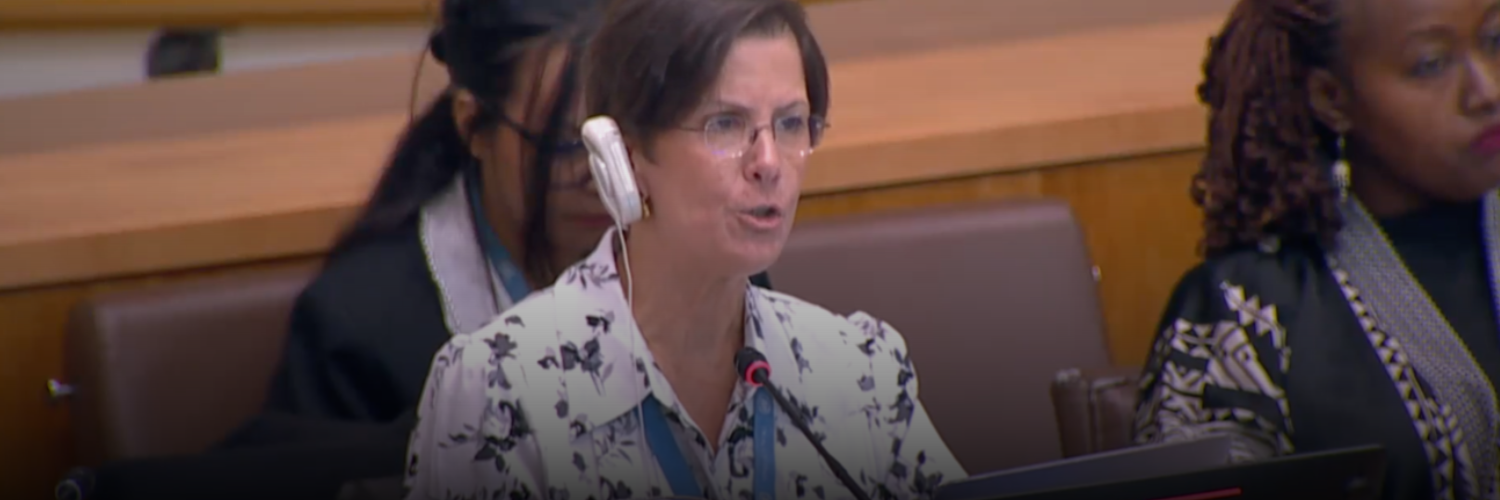UN Official Defends Women’s Sports Against Male Incursion

UN Special Rapporteur on Violence Against Women, Reem Alsaleem
UNITED NATIONS, October 10 (C-Fam) This week, a UN expert ignited an explosive debate about male athletes in women’s sports. The expert called on countries and sports authorities not to allow men to compete in women’s sports.
In her latest report to the General Assembly, the UN Special Rapporteur on Violence Against Women, Reem Alsaleem, called on states to stop allowing “men who self-identify as women” to compete against women and girls in sports.
A visibly irritated U.S. diplomat who wore a rainbow heart lapel pin accused her of using “demeaning language” about “trans” athletes. He accused Alsaleem of a “online harassment, abuse, and gender disinformation” when she presented her report on Tuesday. These and similar accusations were made by delegates from the United Kingdom, Canada, the Netherlands, France, Mexico, Colombia, and other Western countries.
Alsaleem insisted that it is factually correct to refer to these individuals as “men who self-identify as women.” She said, “Human rights language and principles must continue to be consistent with science and facts, including biological ones.”
Men have a “performance advantage” because of higher strength and testosterone levels, Alsaleem argued. As a result, when they are allowed to compete against women, “the risk of injury to athletes is knowingly increased” and “the physical harms sustained can be characterized as violence.”
According to the report, allowing transgender athletes in women’s sports also leads to women and girls experiencing “extreme psychological distress due to the physical disadvantage, the loss of opportunity for fair competition and of educational and economic opportunities and the violation of their privacy in locker rooms and other intimate spaces.” In her report she claimed that “over 600 female athletes in more than 400 competitions have lost more than 890 medals in 29 different sports” in recent years because of transgender policies.
Giving hormone suppressants to male athletes to allow them to compete against women, as some sports leagues do, does not work, Alsalem said. It does not remove the advantage of being a male, and powerful hormonal drugs might even harm the health of the athlete, she said.
The controversy generated by Alsaleem is due not only to a narrow set of sports policies. Her approach undermines the premise of Western and UN-backed gender policies which are based on gender as a social construct unrelated to sex. Alsaleem is proposing that woman’s sports must be based on sex as an objective biological reality instead.
Alsaleem said that any controversy can been avoided only when leagues and sport authorities “recognize that there should be no discrimination based on sex, and not only gender and sex variations.”
“Sex must be understood in its ordinary meaning to mean biological sex,” Alsaleem said, quoting the landmark 1995 UN women’s agreement at the Beijing conference. She went even further, suggesting that while the category of “sex” based on biology was established in international human rights law, the category of “gender” was not and that the two categories must not be confused.
“Nondiscrimination based on sex is recognized in all major international human rights agreements,” she said whereas, “conflating sex and gender identity through the creation of a legal sex category (gender as distinct from sex) has been confusing and problematic.”
Delegates who thanked Alsaleem for her drawing attention to the plight of women in sports included the Russian Federation, Nigeria, Iran and Egypt.
View online at: https://c-fam.org/friday_fax/un-official-defends-womens-sports-against-male-incursion/
© 2026 C-Fam (Center for Family & Human Rights).
Permission granted for unlimited use. Credit required.
www.c-fam.org








